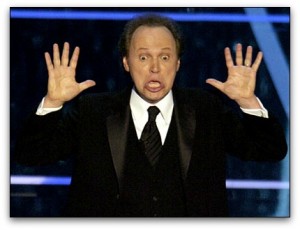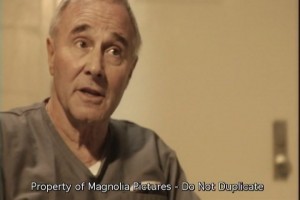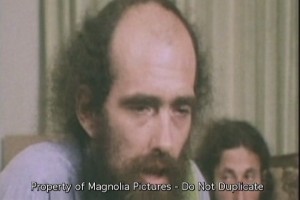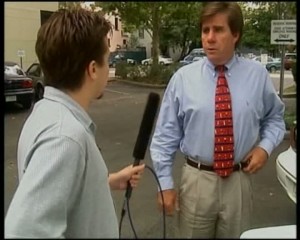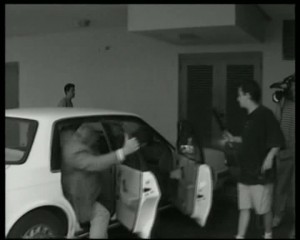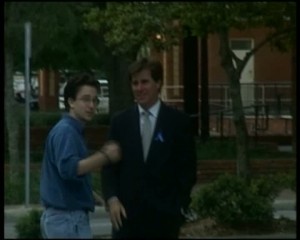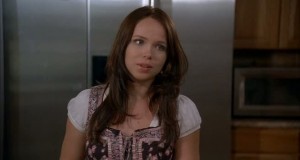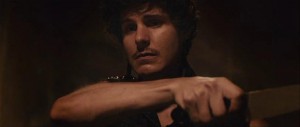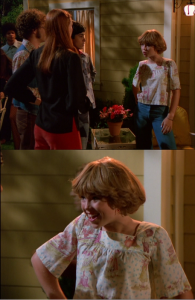If you click on the audio player and it won’t stop buffering, please upgrade to Flash 10, which fixes the error that happens when you have 15 or more audio files on one page. If you don’t want to play the files here and don’t feel like constantly checking the site for updates, these podcasts are also available on Itunes. Search for Adam Lippe or A Regrettable Moment of Sincerity and it should pop up.
The latest podcasts:
 Here is a podcast/radio interview from my appearance on Morning Feed with Ed Feldman from October of 2011, when I was promoting the Medium Rare Cinema screenings of Dream Lover and Comfort and Joy. Like my other appearances on Morning Feed, the topics are wide ranging starting with Harry Dean Stanton and Death Watch and concluding 2 hours later with a brief reference to Ilsa star Dyanne Thorne. In between there are discussions of Emilio Estevez’s magnum opus Wisdom, what a wonderful blowhard Oliver Stone is, how death is always the most efficient way to win an Oscar, what really happened to Orson Welles during the editing of The Magnificent Ambersons, and a slew of other free floating randomness.
Here is a podcast/radio interview from my appearance on Morning Feed with Ed Feldman from October of 2011, when I was promoting the Medium Rare Cinema screenings of Dream Lover and Comfort and Joy. Like my other appearances on Morning Feed, the topics are wide ranging starting with Harry Dean Stanton and Death Watch and concluding 2 hours later with a brief reference to Ilsa star Dyanne Thorne. In between there are discussions of Emilio Estevez’s magnum opus Wisdom, what a wonderful blowhard Oliver Stone is, how death is always the most efficient way to win an Oscar, what really happened to Orson Welles during the editing of The Magnificent Ambersons, and a slew of other free floating randomness.
Some quick corrections for facts I could not remember at the time: Barry Scheck is the lawyer that Peter Gallagher played in Conviction, Robert De Niro has 4 children, and Dyanne Thorne was not in the 1982 version of She.
Download or stream the podcast below. Or you can subscribe on Itunes to the A Regrettable Moment of Sincerity feed.
Download the full interview. Or if you want to listen to the podcast in a new window, just click the link.
 Here’s a podcast with Tim League, creator and CEO of The Alamo Drafthouse and Fantastic Fest. This was recorded around November 2010 and the interview was initiated because Tim and Alamo Drafthouse Films were putting out Chris Morris’ Four Lions as their first film. You can hear my interview with Chris Morris here. This very weekend, Drafthouse Films is releasing Miami Connection, a goofy kung fu film that had been thought lost since its original 1987 release.
Here’s a podcast with Tim League, creator and CEO of The Alamo Drafthouse and Fantastic Fest. This was recorded around November 2010 and the interview was initiated because Tim and Alamo Drafthouse Films were putting out Chris Morris’ Four Lions as their first film. You can hear my interview with Chris Morris here. This very weekend, Drafthouse Films is releasing Miami Connection, a goofy kung fu film that had been thought lost since its original 1987 release.
Tim and I also discuss his involvement as producer on Red, White, and Blue, continuing the conversation lead actress Amanda Fuller and I had about its thematically erratic ending, his contribution to the trailer compilation series 42nd Street Forever, Vol. 5: Alamo Drafthouse Cinema, how to run a repertory theater (a lot of which came in handy when I ran Medium Rare Cinema), hyperbolic critics, genre dishonesty, and a true dissection of a term I created, Phony Whiteboy Nihilism. As per the usual, there are going to be references to things that seem out of nowhere, such as the opening discussion of the trailer for the Sonny Chiba film The Bodyguard. I have posted the trailer for that film and for Lucky Seven below (which will help with my reference to a Wonder Bread robe). On top of that, I put together a musical montage that details the clientele type at the Alamo Drafthouse, made up of footage from the promotional extra on their 42nd Street Forever disc. That’s the very first video you’ll see after the podcast link. Note that the “Grindhouse” film effects were on the original material, and have not been digitally added by me.
Download or stream the podcast below. Or you can subscribe on Itunes to the A Regrettable Moment of Sincerity feed.
Download the full interview. Or if you want to listen to the podcast in a new window, just click the link.
The Bodyguard trailer
Lucky Seven trailer
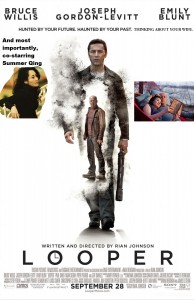 Here is a podcast with actress Summer Qing (also known as Qing Xu), who plays the wife of Bruce Willis‘ character in Rian Johnson‘s twisty action sci-fi film Looper. Summer’s role is the main motivation for Willis’ entire journey through time. Summer was also in a few Chen Kaige films, like Farewell, My Concubine, and one of his early films, which I ask Summer about, Life on a String.
Here is a podcast with actress Summer Qing (also known as Qing Xu), who plays the wife of Bruce Willis‘ character in Rian Johnson‘s twisty action sci-fi film Looper. Summer’s role is the main motivation for Willis’ entire journey through time. Summer was also in a few Chen Kaige films, like Farewell, My Concubine, and one of his early films, which I ask Summer about, Life on a String.
This is a unique interview for me, because it’s the first one I’ve ever done using Skype (so the sound quality is below my usual standard, but still perfectly understandable) and the first time I interviewed someone who had to have my questions translated to another language. That’s why this version of the podcast will be Mandarin friendly, as Summer’s manager Ben Zhang does the translation for her. You’ll hear my surprise at this fact early on, especially in the way I then try to over-explain my questions. As this will be the “rough cut” of the interview (a more concise version will be released soon), you’ll get to hear my questions, Ben’s translation, Summer’s answer, and then Ben Zhang’s translation back to me. You’d think that would make the entire 25 minute interview quite disjointed, but it isn’t, as Summer is able to adequately explain how her part differs in the Chinese version of the film, how government censorship affects the Chinese film industry, and how the moral ambiguity of Looper differs from most films financed by the Chinese (which Looper partially was).
Download or stream the podcast below. Or you can subscribe on Itunes to the A Regrettable Moment of Sincerity feed.
Download the full interview. Or if you want to listen to the podcast in a new window, just click the link.
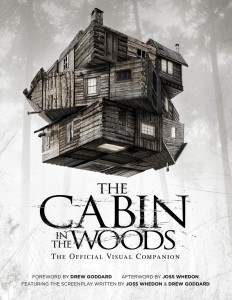 Below is a q+a with actor Fran Kranz, who plays Marty, the resident stoner in the new meta-horror-comedy The Cabin in the Woods. It was recorded after a screening of the film on April 9th in Philadelphia. The Cabin in the Woods is the feature debut of director Drew Goddard under the aegis of Joss Whedon with whom Goddard also wrote Cloverfield for, as well as a handful of episodes of Buffy the Vampire Slayer and Angel.
Below is a q+a with actor Fran Kranz, who plays Marty, the resident stoner in the new meta-horror-comedy The Cabin in the Woods. It was recorded after a screening of the film on April 9th in Philadelphia. The Cabin in the Woods is the feature debut of director Drew Goddard under the aegis of Joss Whedon with whom Goddard also wrote Cloverfield for, as well as a handful of episodes of Buffy the Vampire Slayer and Angel.
Kranz is generally enthusiastic about the film, as he should be, and the interviewer (who I believe said that she was from Hitfix.com) leads Kranz into talking about the troubled distribution history of The Cabin in the Woods (it was shelved for three years during which time the studio that made it, MGM, went bankrupt), the anxiety over the threat of a post-3D conversion, and how the film has so many ideas that it would take a lot of explanation to spoil it.
Personally, I’m on board with most of what Fran has to stay, though he’s led a bit astray by the audience’s questions such as when he flounders while defending the deliberately generic nature of the title. But his most confused answer comes when he criticizes the Saw and Hostel franchises as mindless torture porn without anything to say. As a descriptor, torture porn is questionable reductive analysis, but in this case it’s also misguided because Hostel Part II, like The Cabin in the Woods, is an astute analysis of horror film stereotypes and a smart look behind the curtain of villainous motivations. Mr. Kranz also seems unaware that the studio that he praises for picking up The Cabin in the Woods for distribution, Lions Gate, who he claims “gets it,” is the very studio that was built on the backs of the Saw and Hostel franchises, even going 3D for the final Saw film last year.
Regardless of all of that, the q+a moves briskly, and goes in the occasional odd direction when Kranz throws some vitriol at Gus Van Sant and Michael Haneke for their recent remakes. And despite Fran’s insistence that The Cabin in the Woods is un-spoilable, the final question has Kranz revealing a few small secrets, but nothing overly detrimental. The sound quality of the recording, apart from some slight ambient noise and rustling in the first minute, is generally excellent.
Download or stream the podcast below. Or you can subscribe on Itunes to the A Regrettable Moment of Sincerity feed.
Download the full interview. Or if you want to listen to the podcast in a new window, just click the link.
I was on Gtown radio on Friday morning to talk about the Medium Rare Cinema screening of the uncut version of Burn! (being shown at a new location), but also to talk about the Oscars. I took the opportunity to discuss my experience in voting in the Online Film Critics Society awards, and the various stages which prevent any real surprises, and how that holds true in the Oscar voting as well. Because of the quick turnaround time, this isn’t as polished as some of the other recent podcasts, but it runs a brisk 90 minutes that you can squeeze in while watching the red carpet nonsense on mute.
Download or stream the podcast below. Or you can subscribe on Itunes to the A Regrettable Moment of Sincerity feed.
Download the full interview. Or if you want to listen to the podcast in a new window, just click the link.
(Right-click, Save Link As…)
 Here is the third in a series of no doubt 4 million appearances (or maybe less) that I made on Ed Feldman’s Morning Feed. Originally the interview ran at an epic length, 3 and 1/2 hours. Now, after some judicious editing, it runs at a mini-epic length of 2 hours, but you’ll still get plenty of Mr. Feldman ranting and raving and leching on young female celebrities while I make fun of him for it. My appearance coincided with a screening of Looking for Mr. Goodbar that we held at Medium Rare Cinema back in September. A review of that film will appear on the site soon. Other topics of discussion include Drive, the strange mediocrity of the films of Mike Nichols, the homophobia and misogyny of Mr. Goodbar, Michael Rapaport’s documentary on A Tribe Called Quest, the pitfalls of rote film criticism, and many, many other diversions.
Here is the third in a series of no doubt 4 million appearances (or maybe less) that I made on Ed Feldman’s Morning Feed. Originally the interview ran at an epic length, 3 and 1/2 hours. Now, after some judicious editing, it runs at a mini-epic length of 2 hours, but you’ll still get plenty of Mr. Feldman ranting and raving and leching on young female celebrities while I make fun of him for it. My appearance coincided with a screening of Looking for Mr. Goodbar that we held at Medium Rare Cinema back in September. A review of that film will appear on the site soon. Other topics of discussion include Drive, the strange mediocrity of the films of Mike Nichols, the homophobia and misogyny of Mr. Goodbar, Michael Rapaport’s documentary on A Tribe Called Quest, the pitfalls of rote film criticism, and many, many other diversions.
Download or stream the podcast below. Or you can subscribe on Itunes to the A Regrettable Moment of Sincerity feed.
Download the full interview. Or if you want to listen to the podcast in a new window, just click the link.
(Right-click, Save Link As…)
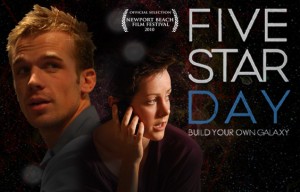 Here’s a podcast with Danny Buday, the writer/director of Five Star Day. Now I’m totally aware that most people will not have heard of this film, Mr. Buday’s first. That’s because Five Star Day, as of November 4th, has received a limited theatrical release, as well as a simultaneous release on Facebook.
Here’s a podcast with Danny Buday, the writer/director of Five Star Day. Now I’m totally aware that most people will not have heard of this film, Mr. Buday’s first. That’s because Five Star Day, as of November 4th, has received a limited theatrical release, as well as a simultaneous release on Facebook.
The movie itself is about a grad student, played by Cam Gigandet, who is to disprove the accuracy of astrology for his ethics class. He titles his paper, “A propaganda campaign of bullshit.” And within 24 hours of handing it in, despite it being his birthday and his horoscope saying that he’s supposed to have a “Five Star Day,” his life completely falls apart. So, his plan is to prove that astrology is bullshit by finding three other people who were born at the same Chicago hospital within a few minutes of him. He finds their addresses and flies from California to Chicago to meet Jena Malone, who plays a bartender with a young child and a troubled relationship with the father (Chris J. Johnson) of her daughter, who happens to be a junkie. Cam then moves on to a well adjusted nurse (Brooklyn Sudano), also living in Chicago, to ask her questions about her birthday that he experienced such a tough time. Finally, he talks to a lounge singer in Atlantic City (played by real-life singer Max Hartman, who gives the best performance in the film) about their shared birthdays, and what the lounge singer went through. Keep in mind that he’s never met or talked to these people before, so his arrival is going to be, at the minimum, a surprise.
Within our interview itself, there are some minor spoilers about Mr. Hartman’s character, but nothing that would ruin your enjoyment of the film. In the midst of the conversation, Danny and I discuss how wise it would be to hand in a paper with profanity in it when your professor (the great Nick Chinlund, unfortunately underused) has told you that you need an A just to pass the class, the questionable idea of just showing up on people’s doorstep, unannounced, and asking personal questions, and whether the marginal believability of certain plot points turns the film into more of a romantic fantasy.
Download or stream the podcast below. Or you can subscribe on Itunes to the A Regrettable Moment of Sincerity feed.
Download the full interview. Or if you want to listen to the podcast in a new window, just click the link.
(Right-click, Save Link As…)
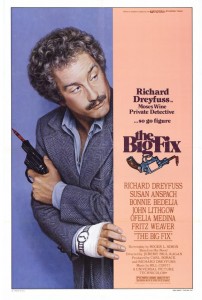 Here’s my second radio appearance on Morning Feed with Ed Feldman. This time I was promoting the Medium Rare Cinema screening of the Richard Dreyfuss vehicle The Big Fix but the conversation once again jumps around a lot to movies being released around that time (June 2011) such as Submarine, Tree of Life, Super 8, as well as my insistence that as many people as possible see the documentary about A Tribe Called Quest, Beats Rhymes & Life. And most importantly, you get to hear a clip from Double Dragon.
Here’s my second radio appearance on Morning Feed with Ed Feldman. This time I was promoting the Medium Rare Cinema screening of the Richard Dreyfuss vehicle The Big Fix but the conversation once again jumps around a lot to movies being released around that time (June 2011) such as Submarine, Tree of Life, Super 8, as well as my insistence that as many people as possible see the documentary about A Tribe Called Quest, Beats Rhymes & Life. And most importantly, you get to hear a clip from Double Dragon.
Once again, I’ve edited the show to its bare minimum eliminating any tangents that don’t go anywhere or local political talk, which still means 90 minutes of banter and me making fun of Ed Feldman’s back hair.
Download the full interview.
(Right-click, Save Link As…)
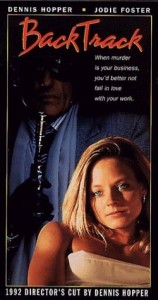 Here’s a podcast with Ann Louise Bardach, journalist for The New York Times, Newsweek, Slate, etc., and the screenwriter of Dennis Hopper’s Backtrack, the director’s cut of which I reviewed here. Now Backtrack was an incredibly troubled production, sitting on the shelf for two years before dumped by its bankrupt distributor in a cut that lost nearly 20 minutes of footage that Hopper had intended for the film and was retitled Catchfire. It wasn’t until 1992 when Live Home Video put out a VHS of Hopper’s preferred cut that any of the footage was available. Unfortunately all of the DVD versions have been the cut version, still re-titled Catchfire.
Here’s a podcast with Ann Louise Bardach, journalist for The New York Times, Newsweek, Slate, etc., and the screenwriter of Dennis Hopper’s Backtrack, the director’s cut of which I reviewed here. Now Backtrack was an incredibly troubled production, sitting on the shelf for two years before dumped by its bankrupt distributor in a cut that lost nearly 20 minutes of footage that Hopper had intended for the film and was retitled Catchfire. It wasn’t until 1992 when Live Home Video put out a VHS of Hopper’s preferred cut that any of the footage was available. Unfortunately all of the DVD versions have been the cut version, still re-titled Catchfire.
In our interview, Ann Louise discuss some of the trouble Hopper found himself on the set, especially as the 1988 writer’s strike was in full swing in the midst of production, and he was just recently sober, which may have caused a lot of the tension that resulted in the cast and crew giving Hopper the silent treatment. During this 15 minute interview (audio quality is fair as cell phone static is an occasional problem) you can also enjoy hearing about how Hopper’s unpredictable whims resulted in the more ridiculous scenes in the film. Download the podcast or stream it below. Or you can go to Itunes and subscribe to A Regrettable Moment of Sincerity.
[audio:http://www.regrettablesincerity.com/audio/AnnLouiseBardachonBacktrack.mp3]Download the full interview. Or if you want to listen to the podcast in a new window, just click the link.
(Right-click, Save Link As…)
 This is my appearance with Ed Feldman on his show Morning Feed, on Gtown Radio, on May 19th, 2011. As of this writing, I’ve appeared 4 times, this being the first, and it runs just a shade under 2 hours. I was there to promote the Medium Rare Cinema screening of John Woo’s Bullet in the Head, but that’ s only a minor sniff of the various topics covered. I will post the next few shows in the upcoming weeks. Those of you who don’t live in Philadelphia will be happy to know that I’ve edited out almost all of the local political references, so you won’t be lost. However, considering the rapid fire pace of the conversation, I do recommend being at least minimally film literate before listening.
This is my appearance with Ed Feldman on his show Morning Feed, on Gtown Radio, on May 19th, 2011. As of this writing, I’ve appeared 4 times, this being the first, and it runs just a shade under 2 hours. I was there to promote the Medium Rare Cinema screening of John Woo’s Bullet in the Head, but that’ s only a minor sniff of the various topics covered. I will post the next few shows in the upcoming weeks. Those of you who don’t live in Philadelphia will be happy to know that I’ve edited out almost all of the local political references, so you won’t be lost. However, considering the rapid fire pace of the conversation, I do recommend being at least minimally film literate before listening.
Download the full interview. Or if you want to listen to the podcast in a new window, just click the link.
(Right-click, Save Link As…)
 Below is an interview with director Billy Corben, who made the two Cocaine Cowboys films, Raw Deal, Limelight, Square Grouper (his new documentary about pot smuggling in Florida, which he happened to be promoting at the time of this interview), and The U, which is relevant now since its subject is Miami University’s football team, and Billy is the go-to expert talking head for any news station or TV show that happens to be covering the current scandal.
Below is an interview with director Billy Corben, who made the two Cocaine Cowboys films, Raw Deal, Limelight, Square Grouper (his new documentary about pot smuggling in Florida, which he happened to be promoting at the time of this interview), and The U, which is relevant now since its subject is Miami University’s football team, and Billy is the go-to expert talking head for any news station or TV show that happens to be covering the current scandal.
Our interview focuses more on Square Grouper and his first film, Raw Deal: A Question of Consent, since I had wanted to interview him about it even before Cocaine Cowboys was made. As per the usual, this isn’t a conversation that stops to explain references, so you’ll find most of the more obscure stuff in the images and the audio file (which refers to a quote about Jimmy Buffet) below.
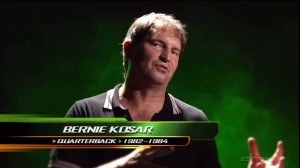 As for the topics that come up in the midst of this 90 minute back and forth, you will learn what the mysterious reasons are behind why Magnolia bothers with theatrical releases (since they simultaneously release their films in the theater, on DVD, air them on TV, and make them available on demand), why Bernie Kosar looks so disheveled in his interviews for The U, and how piracy can actually help a small film become a financial success.
As for the topics that come up in the midst of this 90 minute back and forth, you will learn what the mysterious reasons are behind why Magnolia bothers with theatrical releases (since they simultaneously release their films in the theater, on DVD, air them on TV, and make them available on demand), why Bernie Kosar looks so disheveled in his interviews for The U, and how piracy can actually help a small film become a financial success.
Also, take a look at the Canadian cover for Square Grouper. Billy mentions its “quality,” but the point can’t be made with words alone.
Note that the actual 90 minute interview is underneath the final images, not the tiny clip right beneath this sentence.
“Even if Jimmy Buffet’s a manatee-huggin’ son-of-a-bitch.”
Download the clip here.
(Right-click, Save Link As…)
Download the full podcast below or subscribe to it on Itunes (search for A Regrettable Moment of Sincerity, Adam Lippe, or Billy Corben).
Download the full interview.
(Right-click, Save Link As…)
Here’s a podcast with Amanda Fuller, the star of Red, White & Blue. This interview was recorded in August of 2010, but because of the quick blip on the theatrical radar the film got, I decided to wait until it came out on DVD to release the interview. Now, considering Amanda and I do discuss the conclusion of Red, White & Blue in quite a bit of detail, I wanted to give those who wanted to see the film (which came out on DVD in May) a chance before ruining the final 30 minutes for them. The spoilers begin around the 35 minute mark and if you’ve seen the film already or it’s not something you’d ever see, you’ll probably enjoy the spirited back and forth between us about how the movie should have ended.
The rest of the interview covers her career, including her role as Donna’s sister on That ’70s Show, some of the smaller film and TV roles she’s had, if she’s afraid of being typecast as a girl who is willing to get sliced up in a horror film, but take her top off first, amongst others.
As for the stray details that need context, when I refer to “The Warriors Guy” that’s Mark Senter, and you can see him in his Red, White & Blue regalia below. The q+a that I refer to is because I met Amanda at a screening of Red, White, and Blue last July at the Danger After Dark festival in Philadelphia. Primal Doubt is a TV movie she made for the Lifetime channel a few years ago, and the lead of the film was Janine Turner.
There’s also an extra bonus bit of conversation at the very end.
Download the full podcast below or subscribe to it on Itunes (search for A Regrettable Moment of Sincerity).
Download the full interview.
(Right-click, Save Link As…)
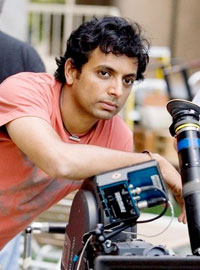 Here’s an audio excerpt from a q+a that M. Night Shyamalan did after a screening of Unbreakable at last October’s Philadelphia Film Festival. Since there were no mics in the audience, only M. Night is completely audible, so I deleted the first question and you just have Night’s answer. Basically the question was about the significance of water in his films. The other topics include a very lengthy and emphatic elucidation on how to get your scripts financed and why the CGI in Signs was so bad. Even if you don’t like Shyamalan or his films, it’s a pretty passionate ten minutes and (spoiler!) there’s no twist ending.
Here’s an audio excerpt from a q+a that M. Night Shyamalan did after a screening of Unbreakable at last October’s Philadelphia Film Festival. Since there were no mics in the audience, only M. Night is completely audible, so I deleted the first question and you just have Night’s answer. Basically the question was about the significance of water in his films. The other topics include a very lengthy and emphatic elucidation on how to get your scripts financed and why the CGI in Signs was so bad. Even if you don’t like Shyamalan or his films, it’s a pretty passionate ten minutes and (spoiler!) there’s no twist ending.
Download the full interview.
(Right-click, Save Link As…)
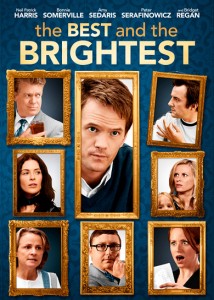 Here’s a podcast with Josh Shelov, the writer/director of The Best and the Brightest. While the film is screening in Philadelphia as you read this (that is, if you’re reading this as soon as I post it, so, that would just be me), it will open in a more traditional fashion in the next few months. The Best and the Brightest is a farce about the very difficult struggles of getting your child into an exclusive pre-K if you live in New York City. The movie, which stars Neil Patrick Harris, John Hodgman, Christopher McDonald, Peter Serafinowicz, Bridget Regan, Amy Sedaris, etc., gets fairly raunchy, so Josh and I discuss how far you push a farce and how believable it has to be. Then we talk about his meeting with famed New Yorker film critic Pauline Kael and why he asked her about Quentin Tarantino. We also get into his career as a studio screenwriter and developing a script with The Hangover director Todd Phillips, and how script development actually works (it does involve coming into an office every day and staring at a computer). The interview, which was conducted face to face, so the sound quality is better than the usual cell phone thing I have to do, runs a little over an hour. Though there’s a logical conclusion, there’s another minute or two which didn’t fit in anywhere, so make sure to keep listening for that.
Here’s a podcast with Josh Shelov, the writer/director of The Best and the Brightest. While the film is screening in Philadelphia as you read this (that is, if you’re reading this as soon as I post it, so, that would just be me), it will open in a more traditional fashion in the next few months. The Best and the Brightest is a farce about the very difficult struggles of getting your child into an exclusive pre-K if you live in New York City. The movie, which stars Neil Patrick Harris, John Hodgman, Christopher McDonald, Peter Serafinowicz, Bridget Regan, Amy Sedaris, etc., gets fairly raunchy, so Josh and I discuss how far you push a farce and how believable it has to be. Then we talk about his meeting with famed New Yorker film critic Pauline Kael and why he asked her about Quentin Tarantino. We also get into his career as a studio screenwriter and developing a script with The Hangover director Todd Phillips, and how script development actually works (it does involve coming into an office every day and staring at a computer). The interview, which was conducted face to face, so the sound quality is better than the usual cell phone thing I have to do, runs a little over an hour. Though there’s a logical conclusion, there’s another minute or two which didn’t fit in anywhere, so make sure to keep listening for that.
Download the full interview.
(Right-click, Save Link As…)
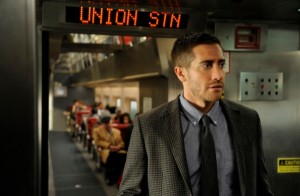 Podcast with Source Code and Moon director Duncan Jones. For those who haven’t seen Source Code, beware that there are many spoilers. In a way this qualifies as a mini-rebuttal of some of the points I made in my review and also my reinforcing some of my positions. Also, I make fun of Sucker Punch, which I saw a few hours after seeing Source Code. Rather than review Sucker Punch, I will re-direct your attention to this Youtube clip, an HD version of Garbage’s video for their song “Special,” which is a much more succinct version of what Sucker Punch was trying to do, and considerably less headache-inducing. Anyway, enjoy the Duncan Jones interview below.
Podcast with Source Code and Moon director Duncan Jones. For those who haven’t seen Source Code, beware that there are many spoilers. In a way this qualifies as a mini-rebuttal of some of the points I made in my review and also my reinforcing some of my positions. Also, I make fun of Sucker Punch, which I saw a few hours after seeing Source Code. Rather than review Sucker Punch, I will re-direct your attention to this Youtube clip, an HD version of Garbage’s video for their song “Special,” which is a much more succinct version of what Sucker Punch was trying to do, and considerably less headache-inducing. Anyway, enjoy the Duncan Jones interview below.
Download the full interview.
(Right-click, Save Link As…)
 Here’s a podcast with Australian director Rolf De Heer. It was originally recorded in August of 2008 and there was even an unedited and intro-free version on the site before. I’ve cleaned it up significantly, trimming 20 minutes and tightening it up to the point where it flows considerably better than it did before. Now since it was one of my very first podcasts, the sound quality is not terrific, as it was recorded using an analog recorder on an incoming overseas call from Australia. However, it’s entirely listenable, if anything, the fact that it is analog makes Rolf sound less robotic and tinny than if I were using a digital recorder on a cell phone.
Here’s a podcast with Australian director Rolf De Heer. It was originally recorded in August of 2008 and there was even an unedited and intro-free version on the site before. I’ve cleaned it up significantly, trimming 20 minutes and tightening it up to the point where it flows considerably better than it did before. Now since it was one of my very first podcasts, the sound quality is not terrific, as it was recorded using an analog recorder on an incoming overseas call from Australia. However, it’s entirely listenable, if anything, the fact that it is analog makes Rolf sound less robotic and tinny than if I were using a digital recorder on a cell phone.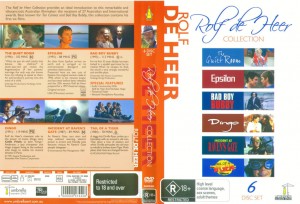 Those unfamiliar with Rolf’s work would benefit from seeing his films, but will not be utterly in the dark, and will be amused by hearing about how Rolf’s directing career started by accident, having to deal with Miramax and Harvey Weinstein during its film butchering heyday, and how your movie can become anachronistic while you’re making it.Speaking of anachronistic, some of my comments about the availability of two of Rolf’s films, Incident at Raven’s Gate and his director’s version of Epsilon, have happily become dated, as there were two 6 disc Australian box sets of Rolf’s films released in 2009. Those sets were also the first time that Tale of a Tiger and Dance Me to My Song were ever released on DVD.The podcast is below:
Those unfamiliar with Rolf’s work would benefit from seeing his films, but will not be utterly in the dark, and will be amused by hearing about how Rolf’s directing career started by accident, having to deal with Miramax and Harvey Weinstein during its film butchering heyday, and how your movie can become anachronistic while you’re making it.Speaking of anachronistic, some of my comments about the availability of two of Rolf’s films, Incident at Raven’s Gate and his director’s version of Epsilon, have happily become dated, as there were two 6 disc Australian box sets of Rolf’s films released in 2009. Those sets were also the first time that Tale of a Tiger and Dance Me to My Song were ever released on DVD.The podcast is below:
Download the full interview.
(Right-click, Save Link As…)

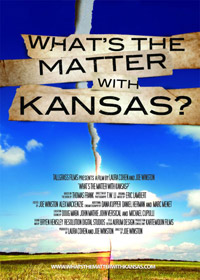 Here’s an audio interview with Joe Winston who directed, along with his wife Laura Cohen, the documentary adaptation of Thomas Frank’s best-selling book, What’s the Matter With Kansas? Though you might think that this will be a discussion between two commie liberals bashing on heartland folk, that assumption would only be half right, because there’s a lot of introspection here, as well as an analysis of being honest with your subjects. And we tried to take the Creation Museum seriously. Anyway, other subject matter includes Christian baseball games, what happens when your content is not as glib as your title, how slain abortion doctor Dr. George Tiller fits in, and my coining of a phrase to properly describe Bill Maher.
Here’s an audio interview with Joe Winston who directed, along with his wife Laura Cohen, the documentary adaptation of Thomas Frank’s best-selling book, What’s the Matter With Kansas? Though you might think that this will be a discussion between two commie liberals bashing on heartland folk, that assumption would only be half right, because there’s a lot of introspection here, as well as an analysis of being honest with your subjects. And we tried to take the Creation Museum seriously. Anyway, other subject matter includes Christian baseball games, what happens when your content is not as glib as your title, how slain abortion doctor Dr. George Tiller fits in, and my coining of a phrase to properly describe Bill Maher.
Because the film is just coming out on DVD and had a very limited theatrical run, I assume that most of you will have n0t seen the film and so, as I did with my podcasts with Jordan Brady and Chris Morris, I’m providing a visual glossary below, so any reference that Joe or I make will become clear if you click on each link as they come up during the discussion.
Click on each link to see the relevant image/reference.
Judas Priest lead singer Rob Halford. Or, just a guy who used to work for Boeing.
Terry the Pastor/post-surgery Roger Ebert
What the pro-choice people think of the former Attorney General.
Main subject Angel Dillard.
M.T. Liggett and his political “art.”
‘Kansas author Thomas Frank. Not former baseball great Frank Thomas.
Wichita farming hero Donn Teske.
The Summer of Mercy and Operation Rescue
Don King-like Congressman Allen West.
Note that the interview was recorded on Thursday afternoon so my reference to Keith Olbermann as a current broadcaster was accurate, at least until Friday evening, when Mr. Olbermann announced he was leaving his show. Also, you may notice that the sound quality has been immensely improved from previous podcasts, as I upgraded some of the recording equipment. Credit to ProAudioStar.com for working with me on that.
Download the full interview.
(Right-click, Save Link As…)
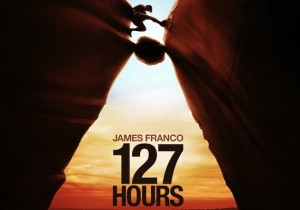 Here’s both a roundtable q+a with 127 Hours director Danny Boyle and an audience q+a recorded after a screening the night before the roundtable was held. There’s a bit of overlap in the 50 total minutes (20 for roundtable, 30 for audience q+a) but considering the audience q+a (which is moderated by Philadelphia Inquirer critic Carrie Rickey) is much longer, Danny gets into more detail. The roundtable includes Sal Cannestra from 215 Magazine, David Onda from Comcast.net, Blaire Flory from Triangle, Steve, whose last name I can never remember, and myself. There were two other participants, but for similar reasons to the Conviction podcast, I’ve replaced their questions with my own voice. Sorry, no Alan Arkin impression this time.
Here’s both a roundtable q+a with 127 Hours director Danny Boyle and an audience q+a recorded after a screening the night before the roundtable was held. There’s a bit of overlap in the 50 total minutes (20 for roundtable, 30 for audience q+a) but considering the audience q+a (which is moderated by Philadelphia Inquirer critic Carrie Rickey) is much longer, Danny gets into more detail. The roundtable includes Sal Cannestra from 215 Magazine, David Onda from Comcast.net, Blaire Flory from Triangle, Steve, whose last name I can never remember, and myself. There were two other participants, but for similar reasons to the Conviction podcast, I’ve replaced their questions with my own voice. Sorry, no Alan Arkin impression this time.
The interviews cover a lot of subject matter such as how much James Franco’s stoned act in real life is actually legit, how one deals with success ass kissing when all you want is honesty, and what it’s like to try to create suspense for a movie when everyone already knows the ending. I also ask a follow-up to something he mentioned in the audience q+a that bothered me about the film and was the crux of my review, namely about how the movie seemed deliberately toned down to appease a mainstream audience.
The podcast is below:
Download the full interview.
(Right-click, Save Link As…)
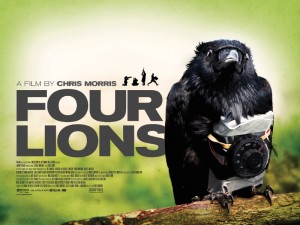 Here’s a podcast with Chris Morris, the writer/director of the suicide bomber satire, Four Lions. While Morris is not particularly well known in the US, he has a huge following in the UK, where his satirical TV shows like Brass Eye, Nathan Barley, and the surrealist shock comedy Jam, have made quite an impression. And for those who wonder why the notoriously press-shy Morris consented to an interview (he hadn’t volunteered for one in almost 15 years), I certainly asked that question, as well as about the inherent homoeroticism of the military, and how a journalist can chase his own tail searching for an overall meaning in a comedy. That last part refers to Morris’ brilliant hipster parody Nathan Barley and as I’m aware that not everyone has seen Morris’ TV work, like my podcast with Jordan Brady, I’m providing a visual glossary below for the many references made to Mr. Morris’ work.
Here’s a podcast with Chris Morris, the writer/director of the suicide bomber satire, Four Lions. While Morris is not particularly well known in the US, he has a huge following in the UK, where his satirical TV shows like Brass Eye, Nathan Barley, and the surrealist shock comedy Jam, have made quite an impression. And for those who wonder why the notoriously press-shy Morris consented to an interview (he hadn’t volunteered for one in almost 15 years), I certainly asked that question, as well as about the inherent homoeroticism of the military, and how a journalist can chase his own tail searching for an overall meaning in a comedy. That last part refers to Morris’ brilliant hipster parody Nathan Barley and as I’m aware that not everyone has seen Morris’ TV work, like my podcast with Jordan Brady, I’m providing a visual glossary below for the many references made to Mr. Morris’ work.
Visual Glossary:
Click on each link for an image that explains the term.
Barry praying in the background.
The actual podcast is below:
Download the full interview.
(Right-click, Save Link As…)
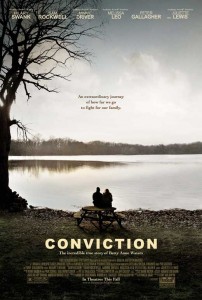 Here’s a podcast about the film Conviction with star Sam Rockwell, director Tony Goldwyn, and subject Betty Anne Waters. [You can read a review of the film here.] While this may seem like a normal roundtable podcast, it is not. This is because I recently got a complaint from another reporter that I was using his questions and stealing his soul while he, I, and other journalists were attending a to-be-recorded, public roundtable. This, despite the fact that this person had appeared in many of my podcasts before and I identified him by name whenever possible — so it isn’t as if he hasn’t been properly represented. As a result, I felt obligated (though not legally, everyone’s tape recorders are running during these interviews, and questions asked are basically public domain by that point) to remove this person from the podcasts. And in this particular recording, just to be safe, I’ve removed everyone else and replaced them with their questions re-written and paraphrased and recorded by a terrible, terrible Alan Arkin impressionist. Why Arkin, well doesn’t Arkin’s persona emanate from every film critic, anyway?
Here’s a podcast about the film Conviction with star Sam Rockwell, director Tony Goldwyn, and subject Betty Anne Waters. [You can read a review of the film here.] While this may seem like a normal roundtable podcast, it is not. This is because I recently got a complaint from another reporter that I was using his questions and stealing his soul while he, I, and other journalists were attending a to-be-recorded, public roundtable. This, despite the fact that this person had appeared in many of my podcasts before and I identified him by name whenever possible — so it isn’t as if he hasn’t been properly represented. As a result, I felt obligated (though not legally, everyone’s tape recorders are running during these interviews, and questions asked are basically public domain by that point) to remove this person from the podcasts. And in this particular recording, just to be safe, I’ve removed everyone else and replaced them with their questions re-written and paraphrased and recorded by a terrible, terrible Alan Arkin impressionist. Why Arkin, well doesn’t Arkin’s persona emanate from every film critic, anyway?
Covered in the 25-minute podcast are subjects like Tony Goldwyn’s view of his own role in the remake of The Last House on the Left; how Hilary Swank — who played Betty Anne in the film — can fool the real Betty Anne’s children into believing that she’s their mom; Sam Rockwell theorizing that his role as a CIA assassin in Confessions of a Dangerous Mind did not color his view of government policies; Goldwyn passionately detailing the struggle regarding removing a crucial bit of information in the film that would have colored the entire movie; and, most importantly, you’ll probably learn how to do a really awful Alan Arkin impression.
P.S. The rumor is that the first actress who was supposedly cast in the Betty Anne role before Swank that Goldwyn refers to (but not by name) was Naomi Watts.
Download the full interview.
(Right-click, Save Link As…)
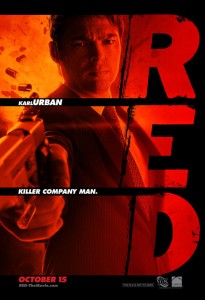 Here’s a podcast with Karl Urban, co-star of the action-comedy Red, reviewed here), with Bruce Willis, Morgan Freeman, John Malkovich, Helen Mirren, and Brian Cox (who was also in a 2008 movie named Red).
Here’s a podcast with Karl Urban, co-star of the action-comedy Red, reviewed here), with Bruce Willis, Morgan Freeman, John Malkovich, Helen Mirren, and Brian Cox (who was also in a 2008 movie named Red).
This is a recording of a conference call between Karl and 3 journalists, including me. It runs quickly and it is short (under 15 minutes).
Now, Karl is a professional (he’s probably already done these press tours for Star Trek, Pathfinder, The Chronicles of Riddick, and the two The Lord of the Rings films he was in) and you can hear how used to the promotional process he is. When he’s caught off guard, and it happens, he can quickly get back on track. There’s nothing all that special about any of his answers, they’re carefully worded, but it gives the listener more insight into the push-pull process between critic and movie star. We try to straddle the line, not revealing our feelings towards the movie too much and the movie star has to pinpoint to us what makes his part of the movie worth highlighting. It’s funny that Karl is barely featured in the ads, but he has the most interesting character to play since the “bad guy” with a real family is a new wrinkle, and so his scenes don’t follow the action-comedy formula as much as the rest of the film. The trailers are trying to sell Red as wacky and cheeky, which it is, and Karl supports that (and there’s a nudge towards asking about Helen Mirren, who has been officially deemed sexy by society, a socially encouraged granny lust), but what would have made Red even more interesting was dealing with the normal mundane day of a CIA agent who is unsure if he’s on the right side, but dutifully does his job and fights to the death anyway. There are a few spoilers in the interview, but if within the first five minutes of watching Red, you can’t tell exactly what is going to happen, you’re probably not older than 7. In which case, congratulations on listening to your first podcast!
P.S. My silly question about his visual resemblance in Red to Johnny Knoxville is partially based on the fact that Knoxville’s film Jackass 3-D opens the same weekend as Red and covets a similar audience, but without being watered down to a PG-13 (Red is the most violent PG-13 film since Knowing).
Download the full interview.
(Right-click, Save Link As…)
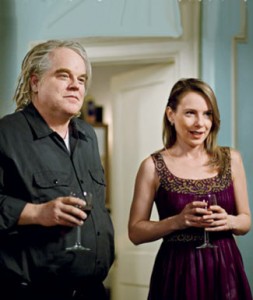 Here’s a podcast with Amy Ryan, Oscar nominated for Gone Baby Gone and Jack Goes Boating, which she was promoting in this particular case. The film is the directorial debut of Phillip Seymour Hoffman, who you can see in the photo to your left, accompanied by his dreadlocks. There were seven of us in the room with Amy and the occasion was brief, so we only had time for a few questions each, which probably makes my absolutely absurd first question either an utter waste of time or an utter waste of time. In my ongoing mission to get more people to see The Missing Person, which Amy produced, that film is the subject of my second question. As for Jack Goes Boating, it’s a small, odd film, based on a stage play, with awkward humor and even more awkward people. It’s playing in limited release now, and some of the questions asked by my colleagues will add to your understanding of the film. Hopefully.
Here’s a podcast with Amy Ryan, Oscar nominated for Gone Baby Gone and Jack Goes Boating, which she was promoting in this particular case. The film is the directorial debut of Phillip Seymour Hoffman, who you can see in the photo to your left, accompanied by his dreadlocks. There were seven of us in the room with Amy and the occasion was brief, so we only had time for a few questions each, which probably makes my absolutely absurd first question either an utter waste of time or an utter waste of time. In my ongoing mission to get more people to see The Missing Person, which Amy produced, that film is the subject of my second question. As for Jack Goes Boating, it’s a small, odd film, based on a stage play, with awkward humor and even more awkward people. It’s playing in limited release now, and some of the questions asked by my colleagues will add to your understanding of the film. Hopefully.
Download the full interview.
(Right-click, Save Link As…)
(Right-click, Save Link As…)
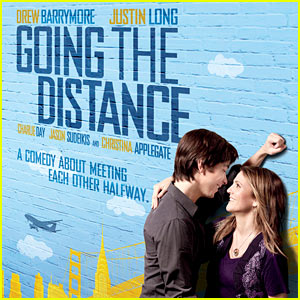 This podcast was a tough one. It’s an interview with the writer of Going the Distance, Geoff LaTulippe. Geoff wrote the original screenplay that was on the 2008 Blacklist (Up in the Air was also on it), which is a list of all of the best unproduced screenplays floating around Hollywood. I’ve read Geoff’s screenplay, or at least one early draft, and I thought it was a pretty funny, dark, mean-spirited romantic comedy with an appropriate and well-written bittersweet conclusion (it can be found in PDF form if you do a little Googling). Unfortunately, other than sharing the title and some of the character’s names, Nanette Burstein’s film of the Going the Distance script, starring Drew Barrymore and Justin Long, is a pandering, irritating disaster. You can read my 2100 word review here.
This podcast was a tough one. It’s an interview with the writer of Going the Distance, Geoff LaTulippe. Geoff wrote the original screenplay that was on the 2008 Blacklist (Up in the Air was also on it), which is a list of all of the best unproduced screenplays floating around Hollywood. I’ve read Geoff’s screenplay, or at least one early draft, and I thought it was a pretty funny, dark, mean-spirited romantic comedy with an appropriate and well-written bittersweet conclusion (it can be found in PDF form if you do a little Googling). Unfortunately, other than sharing the title and some of the character’s names, Nanette Burstein’s film of the Going the Distance script, starring Drew Barrymore and Justin Long, is a pandering, irritating disaster. You can read my 2100 word review here.
I alerted Geoff to my dislike of the film very early on in the interview as I didn’t want it to be a complete surprise that I loathed the movie, easily the worst movie I’ve seen since Phantom Punch back in April of 2009. So I went about asking questions about how he felt about the major differences between his first produced screenplay and the final product, making sure I differentiated between how I felt about the script and the film. He handled it well, especially with all the nit-picking I did, and because he had to carefully support the film if he ever wanted to work again. And I thought that with the way the podcast was going, the interview would be over in 20 minutes, but instead the conversation developed and went on for 2 1/2 hours. I’ve cut it down to about 80-85 minutes for the listeners, which is plenty for those who need to hear me complain about each and every thing I disliked about Going the Distance.
Download the full interview.
(Right-click, Save Link As…)
 Here is a podcast q+a with Kelly McGillis (Witness, Top Gun), recorded during Philadelphia’s QFest (Queerfest), as Ms. McGillis was being given the artistic achievement award. Normally, this isn’t the sort of q+a I’d upload, but the whole thing was so strange, I figured I should share.
Here is a podcast q+a with Kelly McGillis (Witness, Top Gun), recorded during Philadelphia’s QFest (Queerfest), as Ms. McGillis was being given the artistic achievement award. Normally, this isn’t the sort of q+a I’d upload, but the whole thing was so strange, I figured I should share.
To give some context, Ms. McGillis was considered a “get” for the festival, though why she was being given the award is unclear, except for the fact that she came out of the closet last year, she was available, and she lived nearby. That may sound cynical, but the festival was severely under-attended, and the fawning by the small crowd (in a theater that holds 500), made up of about 40 butch lesbians (a fair assessment, specifically reinforced by one of the questions from the crowd), ten or so people from Ms. McGillis’ current home in Collingswood, NJ, and myself and another film critic, seemed to surprise even Ms. McGillis. She was being interviewed by Philadelphia Inquirer critic Carrie Rickey, who had interviewed her for an article that ran a few days before the festival began. That would suggest an established rapport, but Ms. Rickey asked many of the same questions that had appeared in the article, to the point where Ms. McGillis says at one point, “do you want me to answer the same way I did before?” In fact, it happens twice, but only one of them is audible. Despite the familiarity with the questions, Ms. Rickey stumbled quite a bit throughout the hour-long interview, but I’ve cleaned it up to make her sound a lot smoother.
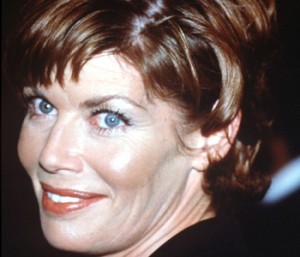 Ms. McGillis does pretty well throughout the interview, she runs the gamut from talking humorously about her Juilliard application and why she was fired from Bachelor Party, to seriously discussing her rape and tearfully describing how she blamed her lover at the time for the incident, to a bit of each talking about her dreadful experience on the set of Abel Ferrara’s mangled adaptation of Elmore Leonard’s novel Cat Chaser. From that point on though, the interview skims over seemingly important details as if it were as controlled and cleaned up as an episode of Inside the Actor’s Studio. A mention that her kids were taken away from her because she was a drunk, a hint of rehab, and what did she do after 1989, other than a few episodes of The L Word? Almost no other work is mentioned except during the questions from the audience. That’s where the interview really takes a strange turn, as the questions go from idiotic (“can you tell us what an ensemble is?”) to fawning (“you are pretty and sexy”) to I don’t know what (“if you could kiss anyone in Hollywood…”). You’ll hear me at one point whisper to the critic next to me, “did that really just happen?”
Ms. McGillis does pretty well throughout the interview, she runs the gamut from talking humorously about her Juilliard application and why she was fired from Bachelor Party, to seriously discussing her rape and tearfully describing how she blamed her lover at the time for the incident, to a bit of each talking about her dreadful experience on the set of Abel Ferrara’s mangled adaptation of Elmore Leonard’s novel Cat Chaser. From that point on though, the interview skims over seemingly important details as if it were as controlled and cleaned up as an episode of Inside the Actor’s Studio. A mention that her kids were taken away from her because she was a drunk, a hint of rehab, and what did she do after 1989, other than a few episodes of The L Word? Almost no other work is mentioned except during the questions from the audience. That’s where the interview really takes a strange turn, as the questions go from idiotic (“can you tell us what an ensemble is?”) to fawning (“you are pretty and sexy”) to I don’t know what (“if you could kiss anyone in Hollywood…”). You’ll hear me at one point whisper to the critic next to me, “did that really just happen?”
If anything, it helped me decide that it was inappropriate to ask the question that was originally the only reason I came to the interview at all. I would have gotten booed out of the theater. I did try to ask it one-on-one but was shooed away by a PR flack, even though Ms. McGillis did try to answer it. My question was based on this article in the film section of The Onion‘s AV Club. Character actor Bronson Pinchot was asked about his experiences on Risky Business and he went into a very funny story describing the way that Tom Cruise was acting in a completely bizarre and unmotivated homophobic way throughout the shoot.
He was tense and made constant, constant unrelated homophobic comments, like, “You want some ice cream, in case there are no gay people there?” I mean, his lingo was larded with the most… There was no basis for it. It was like, “It’s a nice day, I’m glad there are no gay people standing here.” Very, very strange.
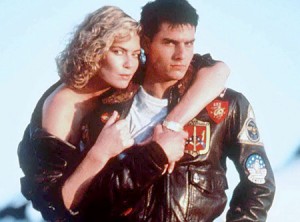 So I wanted to know if Ms. McGillis experienced something similar on the set of Top Gun or was the macho Simpson/Bruckheimer tone of the film so overwhelming as to put a kibosh on it. It’s a strange situation, because here is this closeted woman trying to make a short, “sexually confused” male star look masculine, on the set of a movie that is one of the most notoriously homoerotic films of all time.
So I wanted to know if Ms. McGillis experienced something similar on the set of Top Gun or was the macho Simpson/Bruckheimer tone of the film so overwhelming as to put a kibosh on it. It’s a strange situation, because here is this closeted woman trying to make a short, “sexually confused” male star look masculine, on the set of a movie that is one of the most notoriously homoerotic films of all time.
Anyway, Ms. McGillis said there was none of the anticipatory homophobia from Tom Cruise when she made Top Gun, although she admits during the interview that everyone was hung over on set when they’d show up to work, so who knows how aware she might have been.
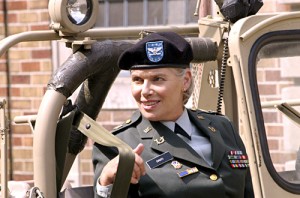 As a whole though, I’m not sure whether this podcast is an overall commentary on how and why film festivals are going away*, hence the low turnout, and how the audience tries really hard to “overlove” the guest as a way to hold on to the experience, or just a celebratory experience for everyone in the room except for myself and the other critic, as we constantly try to reassure ourselves that we are not in fact dreaming.
As a whole though, I’m not sure whether this podcast is an overall commentary on how and why film festivals are going away*, hence the low turnout, and how the audience tries really hard to “overlove” the guest as a way to hold on to the experience, or just a celebratory experience for everyone in the room except for myself and the other critic, as we constantly try to reassure ourselves that we are not in fact dreaming.
* The fact that no one even seemed to notice the juxtaposition of the very emotional moments where Ms. McGillis discusses her rape with the inanity of the questions from the audience adds another layer of strangeness to the proceedings.
You can listen to the podcast by clicking below or downloading it to your computer.
Download the full interview.
(Right-click, Save Link As…)
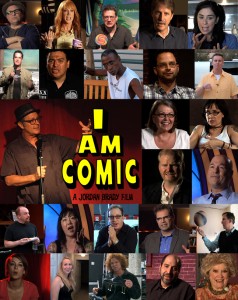 Though this may seem like a normal podcast for A Regrettable Moment of Sincerity, it’s actually unique for a few reasons. First, because the interview with I Am Comic director and stand-up comedian Jordan Brady went on for more than 3 hours, I’ve split it into two parts. Second, because I’m aware that not many people will have seen Jordan’s early movies, namely Dill Scallion, American Girl, The Third Wheel, and Waking Up in Reno, I’ve taken screenshots and added text to explain the references. The images will appear below. So if you don’t know what either of us are talking about, refer to the images and you’ll understand that much better.
Though this may seem like a normal podcast for A Regrettable Moment of Sincerity, it’s actually unique for a few reasons. First, because the interview with I Am Comic director and stand-up comedian Jordan Brady went on for more than 3 hours, I’ve split it into two parts. Second, because I’m aware that not many people will have seen Jordan’s early movies, namely Dill Scallion, American Girl, The Third Wheel, and Waking Up in Reno, I’ve taken screenshots and added text to explain the references. The images will appear below. So if you don’t know what either of us are talking about, refer to the images and you’ll understand that much better.
To see what Ritch Shydner looks like now, he’s in the I Am Comic poster, right next to the title. Here’s a larger version of the image.
Here are the images that will come in handy and the subjects they cover:
Charlize and a sausage: Link
A report card: Link
Gingivitis: Link
Musical kitsch: Link
Broken glass: Link
Hitting the ceiling: Link
Luke’s hair: Link
Bus song: Link
Vitamins:Link
You can listen to the podcast by clicking below or downloading it to your computer.
Download the full interview.
(Right-click, Save Link As…)
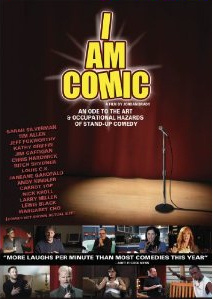 Here is part II with Jordan Brady, stand-up comic, and director of the new documentary on stand-up, I Am Comic. While this podcast was recorded at the same time as part I (which you can find here) and it’s not required to listen to it to understand part II. You’ll probably be confused though, so I still recommend it, especially if you want to know about the minutia on films you’ve never seen like Jordan’s films The Third Wheel, American Girl, Dill Scallion, and Waking Up in Reno.
Here is part II with Jordan Brady, stand-up comic, and director of the new documentary on stand-up, I Am Comic. While this podcast was recorded at the same time as part I (which you can find here) and it’s not required to listen to it to understand part II. You’ll probably be confused though, so I still recommend it, especially if you want to know about the minutia on films you’ve never seen like Jordan’s films The Third Wheel, American Girl, Dill Scallion, and Waking Up in Reno.
Anyway, this podcast deals with why Jordan secretly thinks I’m a big fan of I Am Comic, the wondrous film career of Pink Lady and Jeff star Jeff Altman, what exactly is the stand-up comedy version of AA, how a machine can detect the success of stand-up comedy, and why the film The Aristocrats is actually just a big joke on the audience. And there’s a bonus at the very end, so don’t turn it off right away.
You can listen to the podcast by clicking below or downloading it to your computer.
Download the full interview.
(Right-click, Save Link As…)
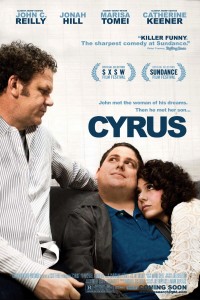 Here’s a podcast q&a with the star of the Duplass brothers’ new film Cyrus, John C. Reilly. The interview was held after a Philadelphia screening of Cyrus. There’s nothing mindblowing about the questions, they cover the expected topics like working with Will Ferrell, Marisa Tomei, and the differences between playing comedy and playing drama. However, what is amazing is Reilly’s timing and how sharp and witty he is, especially in the face of promotional idiocy. You’ll hear a moment where someone offers Reilly a Smirnoff Ice, and walks all the way to the front of the theater to hand him this room temperature bottle, insisting that “it’s a thing, they talked about it on CNN.”
Here’s a podcast q&a with the star of the Duplass brothers’ new film Cyrus, John C. Reilly. The interview was held after a Philadelphia screening of Cyrus. There’s nothing mindblowing about the questions, they cover the expected topics like working with Will Ferrell, Marisa Tomei, and the differences between playing comedy and playing drama. However, what is amazing is Reilly’s timing and how sharp and witty he is, especially in the face of promotional idiocy. You’ll hear a moment where someone offers Reilly a Smirnoff Ice, and walks all the way to the front of the theater to hand him this room temperature bottle, insisting that “it’s a thing, they talked about it on CNN.”
Now after the q&a, as we were leaving the theater, I happened to be walking right behind “Mr. Smirnoff” and despite Mr. Reilly’s previous rebuke, I heard the young promoter say, “he was just pretending, everyone knows about the Smirnoff thing.”
Please keep that in mind the next time someone ambushes you with a warm bottle of teeny-bopper alcohol.
No real spoilers in the questions or answers, but it might help to know that in an early scene, Reilly drunkenly breaks out in song during a rather tension-filled party.
Keep listening after the applause dies down at the end of the podcast for a special bonus., which relates to one of the two questions I asked Reilly (both of which he deflected ).
You can listen to the podcast by clicking below or downloading it to your computer.
Download the full interview.
(Right-click, Save Link As…)
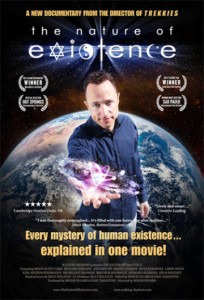 Here’s a podcast with the director of Trekkies, Trekkies 2, High Strung (w/Steve Odekerk and Jim Carrey), Back to Back: American Yakuza 2, Suckers, and his new documentary The Nature of Existence. This hour long podcast covers such topics as how to sell your movie in Japan by adding a vs. to the title, how fans of the new Star Trek remake would change the inevitable Trekkies 3, why his fiction films are so damning of humanity and yet his documentaries are so non-judgmental, how to trust your judgment about how foolish you may or may not make your subjects look, and why it sometimes takes the Russian mob to get a Jim Carrey comedy financed. As per the usual, seeing the films would help your understanding of the podcast, but it’s not a necessity, and you’ll still learn plenty about the low-budget world. Plus there’s a really good story about Elie Samaha.
Here’s a podcast with the director of Trekkies, Trekkies 2, High Strung (w/Steve Odekerk and Jim Carrey), Back to Back: American Yakuza 2, Suckers, and his new documentary The Nature of Existence. This hour long podcast covers such topics as how to sell your movie in Japan by adding a vs. to the title, how fans of the new Star Trek remake would change the inevitable Trekkies 3, why his fiction films are so damning of humanity and yet his documentaries are so non-judgmental, how to trust your judgment about how foolish you may or may not make your subjects look, and why it sometimes takes the Russian mob to get a Jim Carrey comedy financed. As per the usual, seeing the films would help your understanding of the podcast, but it’s not a necessity, and you’ll still learn plenty about the low-budget world. Plus there’s a really good story about Elie Samaha.
If you want to learn more about Roger, you can go to his websites, RogerNygard.com and TheNatureofExistence.com.
You can listen to the podcast by clicking below or downloading it to your computer.
Download the full interview.
(Right-click, Save Link As…)
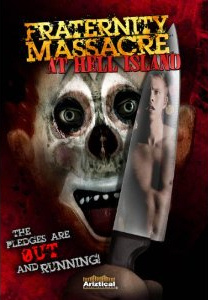 Below is a podcast I did with Mark Jones, the director of Fraternity Massacre at Hell Island, a very low-budget gay slasher parody. And since the movie was finished in 2005, did the festival circuit in 2007, and was finally released on DVD in April probably means that not only have none of you reading this has seen the movie, you’ve never heard of it.
Below is a podcast I did with Mark Jones, the director of Fraternity Massacre at Hell Island, a very low-budget gay slasher parody. And since the movie was finished in 2005, did the festival circuit in 2007, and was finally released on DVD in April probably means that not only have none of you reading this has seen the movie, you’ve never heard of it.
Luckily, this 17 minute interview covers all sorts of other topics that only tangentially deal with the movie (while still discussing it), such as, how do you make a movie deliberately bad without winking too much while still figuring out how much skill should be evident, can you make a fraternity more homoerotic, how Mark’s pastor feels about the nudity and violence in his movie, considering there are a number of extraordinarily obscure references, who exactly is the audience for his film, and whether he’s aware that he shares the name of the guy who directed Leprechaun.
The recording is nearly perfect except for the occasional background sound of an air purifier for the first three minutes (it gets turned off after that) and the fact that I sound very nasal throughout. The purifier is not really a distraction, just trying to make sure that those of you listen don’t think you’re going insane.
Click the play icon to listen to the podcast.
Download the full interview.
(Right-click, Save Link As…)
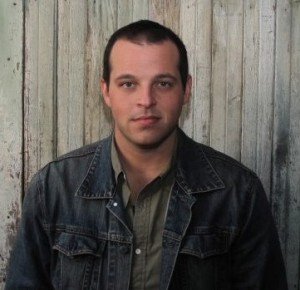
- Thanks to Natalie Toren for the photo.
Here’s an audio interview I conducted with character actor Daniel Franzese, star of Bully, Mean Girls, The Missing Person, and the upcoming remake of I Spit on Your Grave. In the course of an hour, Daniel told many detailed stories about how he was cast in Bully, despite Larry Clark’s intense dislike of him, how Mean Girls helped his career but not the variety of scripts he was offered, the production problems with Killer Pad, what happens when you show up to the set and the script is not at all what you signed up for (Cruel World), how he navigates the conundrum of avoiding and yet requiring typecasting, and how the remake of I Spit on Your Grave walks the exploitation/feminist line.
The interview, which was recorded in November of 2009, while I Spit on Your Grave was still in production, covers a number of other subjects, and I certainly tried to get him to answer the important questions, such as, what, exactly, would a good version of I Spit on Your Grave look like? He also tells a very amusing, yet sad anecdote about his first animated film and why it was finished five years ago, and despite a big budget (from the producers of The Polar Express and Beowulf), is still unreleased. After the interview ends, there’s a 2 minute segment about The Missing Person that didn’t really fit anywhere in the main portion of the podcast.
Click the play icon to listen to the podcast.
Download the full interview.
(Right-click, Save Link As…)
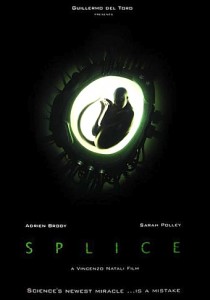 Here’s a 30 minute q+a with Vincenzo Natali, the director of Splice, which I recorded after a screening of the film last week. Vincenzo was very composed and self-effacing and was willing to answer any question (including a deliberately absurd one I ask early on). Those who haven’t seen Splice may want to skip through the spoilers which tend to come in the first few minutes, though they might be vague enough (such as the name for the genetic mutation, Dren) for those without any familiarity with Natali’s solemnly goofy Frankensteinesque movie. I’ve cut out the truly pointless questions (“what was it like to work with Sarah Polley and …..”) have cleaned the sound up as much as possible for something recorded on the fly. The first two minutes contain minor audio disruptions (listen to that soda can roll down the aisle!), Natali starts out (within the recording) answering a question about the audience response to the more outrageous elements of his film, but after that, the sound is surprisingly clean. Some questions posed by the audience include why he likes to shoot with such small casts, what freakish scientific experiments he discovered while doing research, what he had to do with the Cube sequels, and whether he was concerned that the far right would use Splice for their own political gain.
Here’s a 30 minute q+a with Vincenzo Natali, the director of Splice, which I recorded after a screening of the film last week. Vincenzo was very composed and self-effacing and was willing to answer any question (including a deliberately absurd one I ask early on). Those who haven’t seen Splice may want to skip through the spoilers which tend to come in the first few minutes, though they might be vague enough (such as the name for the genetic mutation, Dren) for those without any familiarity with Natali’s solemnly goofy Frankensteinesque movie. I’ve cut out the truly pointless questions (“what was it like to work with Sarah Polley and …..”) have cleaned the sound up as much as possible for something recorded on the fly. The first two minutes contain minor audio disruptions (listen to that soda can roll down the aisle!), Natali starts out (within the recording) answering a question about the audience response to the more outrageous elements of his film, but after that, the sound is surprisingly clean. Some questions posed by the audience include why he likes to shoot with such small casts, what freakish scientific experiments he discovered while doing research, what he had to do with the Cube sequels, and whether he was concerned that the far right would use Splice for their own political gain.
After the q+a was over, I did walk up to Vincenzo another question, privately, which you’ll hear at the very end of the recording, though it does spoil a bit of Act III.
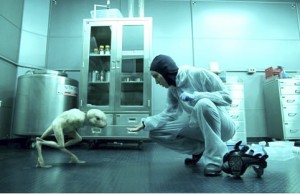 One question that was not recorded was when I asked Vincenzo (who also directed Cypher and Nothing) if he thought Sarah Polley had taken the lead role, that of a scientist trying to use cloning and genetic manipulations to cure diseases like Alzheimer’s, because she had directed Away From Her, also about Alzheimer’s. He hadn’t considered that angle but said Sarah thought the script for Splice was amusingly silly and was glad to be on board for a movie that had such a good sense of humor.
One question that was not recorded was when I asked Vincenzo (who also directed Cypher and Nothing) if he thought Sarah Polley had taken the lead role, that of a scientist trying to use cloning and genetic manipulations to cure diseases like Alzheimer’s, because she had directed Away From Her, also about Alzheimer’s. He hadn’t considered that angle but said Sarah thought the script for Splice was amusingly silly and was glad to be on board for a movie that had such a good sense of humor.
Splice opens nationwide on June 4th. Also, please ignore the generic look of the film’s poster; Splice is neither a rip-off of Alien nor Species despite the deceptively mundane advertising campaign.
Click the play icon to listen to the podcast.
Download the full interview.
(Right-click, Save Link As…)
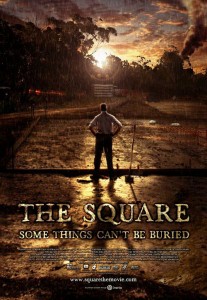 Australian stuntman Nash Edgerton made his first feature, The Square, back in 2008, but it was just released in the US. The film is a twisty noir that takes place in a small, insular town, similar to Henrik Ruben Genz’s Terribly Happy (which also got a podcast dedicated to it). I interviewed Edgerton along with a writer from Film Threat (he’s the one with the husky voice) and the 14 minute podcast below covers many plot details about The Square, so be wary of spoilers (though the movie is so complicated that you’re not likely to connect the dots from listening to our interview). Other topics include, why he stocked his film with so many characters with mullets, whether or not Foster’s is really just an exported beer, his short film Spider (which has been attached to the theatrical release of The Square), Not Quite Hollywood and the Australian film industry in the 1970s, etc. There’s also a special treat at the end of the podcast: I tell a story about Wolf Creek that has nothing to do with The Square, I just really needed everyone to focus on me for a minute.
Australian stuntman Nash Edgerton made his first feature, The Square, back in 2008, but it was just released in the US. The film is a twisty noir that takes place in a small, insular town, similar to Henrik Ruben Genz’s Terribly Happy (which also got a podcast dedicated to it). I interviewed Edgerton along with a writer from Film Threat (he’s the one with the husky voice) and the 14 minute podcast below covers many plot details about The Square, so be wary of spoilers (though the movie is so complicated that you’re not likely to connect the dots from listening to our interview). Other topics include, why he stocked his film with so many characters with mullets, whether or not Foster’s is really just an exported beer, his short film Spider (which has been attached to the theatrical release of The Square), Not Quite Hollywood and the Australian film industry in the 1970s, etc. There’s also a special treat at the end of the podcast: I tell a story about Wolf Creek that has nothing to do with The Square, I just really needed everyone to focus on me for a minute.
You can listen to the podcast by clicking below or downloading it to your computer.
Download the full interview.
(Right-click, Save Link As…)
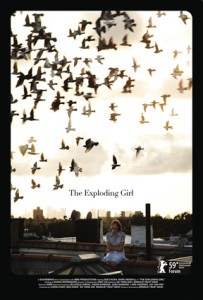 Here’s an interview I did with Zoe Kazan, the star of Bradley Rust Gray’s spare, no-frills drama, The Exploding Girl. Kazan, who won a best actress award at The Tribeca Film Festival for the film, plays a girl struggling with her epilepsy, and so Zoe and I discussed how to keep her emotions in check, why she might wear pigtails for more than practical reasons, and shooting an entire film with long lenses, amongst other things. The interview is a shade under 8 minutes and the self-indulgence I pride myself on is in full effect.
Here’s an interview I did with Zoe Kazan, the star of Bradley Rust Gray’s spare, no-frills drama, The Exploding Girl. Kazan, who won a best actress award at The Tribeca Film Festival for the film, plays a girl struggling with her epilepsy, and so Zoe and I discussed how to keep her emotions in check, why she might wear pigtails for more than practical reasons, and shooting an entire film with long lenses, amongst other things. The interview is a shade under 8 minutes and the self-indulgence I pride myself on is in full effect.
You can listen to the podcast by clicking below or downloading it to your computer.
Download the full interview.
(Right-click, Save Link As…)
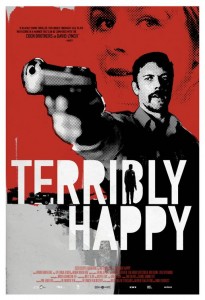 Below is an interview with the director of the Danish dark comedy Terribly Happy, Henrik Ruben Genz. We discuss the connections between his film and Blood Simple, the satirical underpinnings of Terribly Happy and how that relates to political refugees in Denmark, the inherent humor within the arrogance of Dogme ’95 and how Lars Von Trier is viewed in his native country, and the unique way that Danish films are financed, among other things. The interview runs just over 35 minutes and some of the audio, especially on Henrik’s end, is not the best, since he was calling me from Denmark on a cell phone, but I’ve done what I can to clean it up and you should have no problem hearing all of it.
Below is an interview with the director of the Danish dark comedy Terribly Happy, Henrik Ruben Genz. We discuss the connections between his film and Blood Simple, the satirical underpinnings of Terribly Happy and how that relates to political refugees in Denmark, the inherent humor within the arrogance of Dogme ’95 and how Lars Von Trier is viewed in his native country, and the unique way that Danish films are financed, among other things. The interview runs just over 35 minutes and some of the audio, especially on Henrik’s end, is not the best, since he was calling me from Denmark on a cell phone, but I’ve done what I can to clean it up and you should have no problem hearing all of it.
You can listen to the podcast by clicking below or downloading it to your computer.
Download the full interview.
(Right-click, Save Link As…)
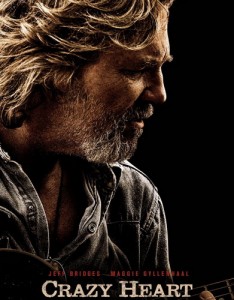 Here’s a podcast with Crazy Heart director Scott Cooper who led lead actor Jeff Bridges to a Golden Globe Award. The film is about “Bad” Blake, an alcohol soaked, washed up rock/blues singer, touring dingy bars across the US. Unable to get albums released without the help of his former protege, and now big star, Tommy Sweet (played by Colin Farrell), Blake, bitter and angry, flounders amidst one-night stands in sleazy motels.
Here’s a podcast with Crazy Heart director Scott Cooper who led lead actor Jeff Bridges to a Golden Globe Award. The film is about “Bad” Blake, an alcohol soaked, washed up rock/blues singer, touring dingy bars across the US. Unable to get albums released without the help of his former protege, and now big star, Tommy Sweet (played by Colin Farrell), Blake, bitter and angry, flounders amidst one-night stands in sleazy motels.
Crazy Heart is Cooper’s first film behind the camera, he’s had an reasonable career as an actor (which was how he met the film’s co-star and producer Robert Duvall), and that likely prepared him for interview situations as he’s poised and confident throughout the five reporter roundtable. The interview went on for just over twenty minutes, covering subject matters like influences and inspirations, casting, and how to avoid using screenplay handbooks (like Syd Field manuals) in order to maintain a realistic feel and tone.
Apart from some interference during the opening seconds as Cooper told us about his roots, audio quality is pretty good throughout. There is a pause at the end before my final question about financing and how the original production company, Paramount Vantage, shut down before the movie was released.
You can listen to the podcast by clicking below or downloading it to your computer.
Download the full interview.
(Right-click, Save Link As…)
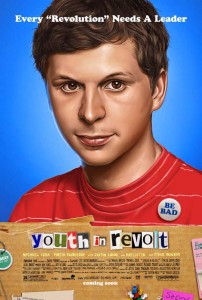 Here’s an audio interview conducted in a room full of reporters with Youth In Revolt (reviewed here) stars Michael Cera and Portia Doubleday. While all 15 of us got to ask 2 questions each*, there were a plethora of tangents that had nothing to do with the movie (yes, Cera would be interested in an Arrested Development movie, but there’s apparently no finished script yet), so I cut the interview down to just under a still rather loose 11 minutes and change. For those unfamiliar with either C.D. Payne’s series of books or Miguel Arteta’s movie adaptation (which will be released on January 8th), some of the answers may not mean anything to you. The basics you need to understand is that Cera’s character, Nick Twisp, is obsessed with sex, and virtually every scene is a variation on Nick being teased to the point of pain or utter frustration at a lost opportunity, and the desperate lengths he’ll go to lose his virginity. Think of Youth in Revolt as one of those sleazy R rated teensploitation movies from the 80’s, like Spring Break or The Last American Virgin, but smarter, funnier, and with a better cast (Steve Buscemi, Ray Liotta, Zach Galifianakis, Justin Long, Fred Willard, etc.).
Here’s an audio interview conducted in a room full of reporters with Youth In Revolt (reviewed here) stars Michael Cera and Portia Doubleday. While all 15 of us got to ask 2 questions each*, there were a plethora of tangents that had nothing to do with the movie (yes, Cera would be interested in an Arrested Development movie, but there’s apparently no finished script yet), so I cut the interview down to just under a still rather loose 11 minutes and change. For those unfamiliar with either C.D. Payne’s series of books or Miguel Arteta’s movie adaptation (which will be released on January 8th), some of the answers may not mean anything to you. The basics you need to understand is that Cera’s character, Nick Twisp, is obsessed with sex, and virtually every scene is a variation on Nick being teased to the point of pain or utter frustration at a lost opportunity, and the desperate lengths he’ll go to lose his virginity. Think of Youth in Revolt as one of those sleazy R rated teensploitation movies from the 80’s, like Spring Break or The Last American Virgin, but smarter, funnier, and with a better cast (Steve Buscemi, Ray Liotta, Zach Galifianakis, Justin Long, Fred Willard, etc.).
During the interview, when Portia (in her first film and playing Nick’s main object of desire, Sheeni), refers to the scene in the woods or shooting the scene on the beach, and how that sped up the “getting to know you period,” but doesn’t get into a lot of details, it has to do with rather blatant sexual situations, which you can get an idea of by watching the Redband trailer for the film. Since there were so many tape recorders and microphones in the room, any minor noises you may hear are a result of that, so don’t think that there’s something wrong with your ears or the recording.
You can listen to the podcast by clicking below or downloading it to your computer.
Download the full interview.
(Right-click, Save Link As…)
* My first question was about an extra character in the novel that wasn’t in the movie and my second was about the possibility of Cera finally taking on grown-up roles.
 Here’s an audio interview I did with Alexis Spraic, the director of Shadow Billionaire, a movie without a distributor at the moment, that I reviewed here. We talk about how hard it must be to profile her subject Larry Hillblom, DHL magnate and procurer of young Vietnamese and Filipino virgin girls, in an objective fashion, how specific film festivals are, and how documentaries are often just preaching to the converted. You can listen to the podcast by clicking below or downloading it to your computer.
Here’s an audio interview I did with Alexis Spraic, the director of Shadow Billionaire, a movie without a distributor at the moment, that I reviewed here. We talk about how hard it must be to profile her subject Larry Hillblom, DHL magnate and procurer of young Vietnamese and Filipino virgin girls, in an objective fashion, how specific film festivals are, and how documentaries are often just preaching to the converted. You can listen to the podcast by clicking below or downloading it to your computer.
Download the full interview.
(Right-click, Save Link As…)
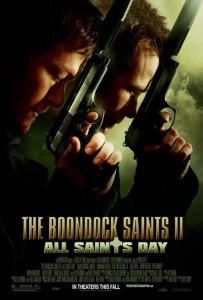 Here’s a nearly 30 minute interview I did with Troy Duffy, the director of The Boondock Saints and the upcoming The Boondock Saints II: All Saints Day (he was also the subject of the muckraking documentary Overnight). Also in attendance were Boondock stars Sean Patrick Flannery and Norman Reedus. Sean is very talkative, but Norman almost never interjects and is very soft-spoken. You’ll hear me address him directly about 11 minutes in by saying, “Norman, I feel like I’m ignoring you.” The topics covered in the first 2/3 are mostly about The Boondock Saints II (which I reviewed here), the casting, the gay jokes, the fat jokes, the differences between the first and second film, the budget, trying to pretend that you shot in Boston instead of Toronto, and a lot of incidents where I try and then fail to be polite while insulting Troy. The last third of the interview ranges in discussion from how a critic conducts an interview about a movie he doesn’t like, Norman making suggestions that I might have ulterior motives, director Ted V. Mikels*, Jamie Kennedy, Inglourious Basterds, and how arbitrary acting and editing awards are. There are embarrassing moments all around, but I made some minor audio trims (nothing important) which occasionally may be a bit awkward because the interview was held in a restaurant/bar so the ambient noise level varied. As per the usual, you can play the file below or download it to your hard drive.
Here’s a nearly 30 minute interview I did with Troy Duffy, the director of The Boondock Saints and the upcoming The Boondock Saints II: All Saints Day (he was also the subject of the muckraking documentary Overnight). Also in attendance were Boondock stars Sean Patrick Flannery and Norman Reedus. Sean is very talkative, but Norman almost never interjects and is very soft-spoken. You’ll hear me address him directly about 11 minutes in by saying, “Norman, I feel like I’m ignoring you.” The topics covered in the first 2/3 are mostly about The Boondock Saints II (which I reviewed here), the casting, the gay jokes, the fat jokes, the differences between the first and second film, the budget, trying to pretend that you shot in Boston instead of Toronto, and a lot of incidents where I try and then fail to be polite while insulting Troy. The last third of the interview ranges in discussion from how a critic conducts an interview about a movie he doesn’t like, Norman making suggestions that I might have ulterior motives, director Ted V. Mikels*, Jamie Kennedy, Inglourious Basterds, and how arbitrary acting and editing awards are. There are embarrassing moments all around, but I made some minor audio trims (nothing important) which occasionally may be a bit awkward because the interview was held in a restaurant/bar so the ambient noise level varied. As per the usual, you can play the file below or download it to your hard drive.
Download the full interview.
(Right-click, Save Link As…)
* I did make a mistake during the interview when talking about Mikels’ films, there are only two Astro-Zombie movies, not five.
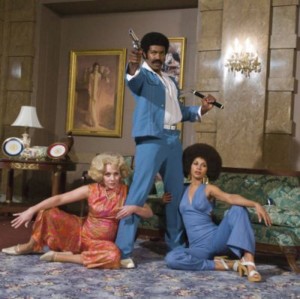 Here’s an interview with the writer/star and the director of the new blaxploitation parody, Black Dynamite, Michael Jai White (Spawn) and Scott Sanders (the review of the movie is here). The topics covered include comparisons to the movie Grindhouse, the political agenda of Black Dynamite, the specificity of the blaxploitation era (as well as the way other films of the era were thrown under the bus of that description, simply for having a black lead), the impossibility of making a genuine updated example of the genre and the unfortunate way that blaxploitation has gone from being denigrated to camp, and a host of other discussions. The recording was done in a hotel room (you’ll hear some coffee cups clinking) with myself and three other critics, Chris Brown, the editor of The Elitist Magazine, Janday Wilson, a writer for Two.One.Five. Magazine, and Irv Slifkin, a writer for Movies Unlimited. Chris asked his question first, followed by me (I asked about Sanders’ first film, Thick as Thieves, a comedic thriller with Alec Baldwin from 1998), Janday, and then Irv. Mr. Sanders speaks first and you’ll be able to tell when Mr. White offers up his thoughts, since his voice is as Barry White-ish as you can imagine.
Here’s an interview with the writer/star and the director of the new blaxploitation parody, Black Dynamite, Michael Jai White (Spawn) and Scott Sanders (the review of the movie is here). The topics covered include comparisons to the movie Grindhouse, the political agenda of Black Dynamite, the specificity of the blaxploitation era (as well as the way other films of the era were thrown under the bus of that description, simply for having a black lead), the impossibility of making a genuine updated example of the genre and the unfortunate way that blaxploitation has gone from being denigrated to camp, and a host of other discussions. The recording was done in a hotel room (you’ll hear some coffee cups clinking) with myself and three other critics, Chris Brown, the editor of The Elitist Magazine, Janday Wilson, a writer for Two.One.Five. Magazine, and Irv Slifkin, a writer for Movies Unlimited. Chris asked his question first, followed by me (I asked about Sanders’ first film, Thick as Thieves, a comedic thriller with Alec Baldwin from 1998), Janday, and then Irv. Mr. Sanders speaks first and you’ll be able to tell when Mr. White offers up his thoughts, since his voice is as Barry White-ish as you can imagine.
Download the full interview.
(Right-click, Save Link As…)
P.S. Mr. White makes a few mistakes in his answer to Irv’s first question, namely that he says Mario van Peebles instead of his father, Melvin, actually directed the groundbreaking Sweet Sweetback’s Baadasssss Song. Also, his assertion that blaxploitation movies saved the studios is an enormous stretch, if not completely incorrect, especially as most of the genre’s films were produced independently (such as by Roger Corman’s AIP). Even the successful studio films, like Shaft, which, while certainly being profitable, hardly made a dent in the debt of the floundering studios.
 This is the radio interview I did with the editors of Outlook Weekly. The broadcast was about a two-part story I did for Outlook I pretended be an ex-gay going through Christian reorientation therapy. The first part, which you can read here, appeared in Outlook Weekly in June of 2008, the second part, which you can read here ran in September of 2008. You can listen to the podcast below or download it using the link underneath the audio player.
This is the radio interview I did with the editors of Outlook Weekly. The broadcast was about a two-part story I did for Outlook I pretended be an ex-gay going through Christian reorientation therapy. The first part, which you can read here, appeared in Outlook Weekly in June of 2008, the second part, which you can read here ran in September of 2008. You can listen to the podcast below or download it using the link underneath the audio player.
Or you can Download the full interview here.
(Right-click, Save Link As…)
Below is a podcast I conducted with Soylent Green about his reaction to Mike Judge’s Extract. You can read my review of the film here.
Click the play icon to listen to the podcast.
Or you can download the podcast here.
(Right-click, Save Link As…)
 Below is a podcast I conducted with Jesus about his reaction to the recent 3-D hit, The Final Destination. You can read my review of the film here.
Below is a podcast I conducted with Jesus about his reaction to the recent 3-D hit, The Final Destination. You can read my review of the film here.
Click the play icon to listen to the podcast.
Or you can download the podcast here.
(Right-click, Save Link As…)
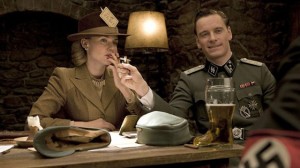 Below you’ll find a podcast about Quentin Tarantino’s Inglourious Basterds, which I conducted with the famed star of 30 years worth of films, Benji. You can read a review of the film here.
Below you’ll find a podcast about Quentin Tarantino’s Inglourious Basterds, which I conducted with the famed star of 30 years worth of films, Benji. You can read a review of the film here.
Click the play icon to listen to the podcast.
Or you can download the podcast here.
(Right-click, Save Link As…)
Below you’ll find an interview with the director of Fissure, Russ Pond (the review can be read here), that I conducted recently. The interview is about 17 minutes long and I’ve broken it up into three parts. The first two parts discuss the movie itself, so if you want to avoid spoilers, I’d be cautious about listening to it. For those who just want to hear what Russ has to say about making a very low-budget independent genre movie and the business involved in that, you should listen to part three only.
Click the play icon to listen to Part I.
Or you can download Part I here.
(Right-click, Save Link As…)
Click the play icon to listen to Part II.
Or you can download Part II here.
(Right-click, Save Link As…)
Click the play icon to listen to Part III.
Or you can download Part III here.
(Right-click, Save Link As…)
Click the play icon to listen to the District 9 podcast (or read the review here) with guest the official mascot for Hamburger Helper, Helping Hand.
Or you can download the podcast here.
(Right-click, Save Link As…)
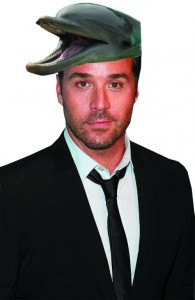 Click the play icon to listen to The Cove podcast, with guest Pol Pot.
Click the play icon to listen to The Cove podcast, with guest Pol Pot.
Or you can download the podcast here.
(Right-click, Save Link As…)
Click here to read the review of The Cove.
 Click the play icon to listen to the Humpday podcast, with my special guest, famed 13-year-old film critic, Jordan Walters.
Click the play icon to listen to the Humpday podcast, with my special guest, famed 13-year-old film critic, Jordan Walters.
Or you can download the podcast here.
(Right-click, Save Link As…)
Click here to read the Humpday review or go here to read an interview with Humpday director Lynn Shelton.
<a href=”http://regrettablesincerity.com/wp-content/uploads/2012/04/cabin-in-woods2.jpg”><img class=”alignleft size-medium wp-image-8373″ title=”cabin-in-woods2″ src=”http://regrettablesincerity.com/wp-content/uploads/2012/04/cabin-in-woods2-232×300.jpg” alt=”” width=”232″ height=”300″ /></a>Below is a q+a with actor Fran Kranz, who plays Marty, the resident stoner in the new meta-horror-comedy <em>The Cabin in the Woods</em>. It was recorded after a screening of the film on April 9th in Philadelphia. <em>The Cabin in the Woods </em>is the feature debut of director Drew Goddard under the aegis of Joss Whedon with whom Goddard also wrote <em>Cloverfield </em>for, as well as a handful of episodes of <em>Buffy the Vampire Slayer </em>and <em>Angel</em>.
Kranz is generally enthusiastic about the film, as he should be, and the interviewer (who I believe said that she was from Hitfix.com) leads Kranz into talking about the troubled distribution history of <em>The Cabin in the Woods </em>(it was shelved for three years during which time the studio that made it, MGM, went bankrupt)<em>, </em>the anxiety over the threat of a post-3D conversion, and how the film has so many ideas that it would take a lot of explanation to spoil it.
Personally, I’m on board with most of what Fran has to stay, though he’s led a bit astray by the audience’s questions such as when he flounders while defending the deliberately generic nature of the title. But his most confused answer comes when he criticizes the <span style=”color: #0000ff;”><em><a href=”http://www.regrettablesincerity.com/?p=251″><span style=”color: #0000ff;”>Saw</span></a> </em></span>and <em>Hostel </em>franchises as mindless torture porn without anything to say. As a descriptor, torture porn is questionable reductive analysis, but in this case it’s also misguided because <em><a href=”http://regrettablesincerity.com/?p=2583″><span style=”color: #0000ff;”>Hostel Part II</span></a></em>, like <em>The Cabin in the Woods</em>, is an astute analysis of horror film stereotypes and a smart look behind the curtain of villainous motivations. Mr. Kranz also seems unaware that the studio that he praises for picking up <em>The Cabin in the Woods </em>for distribution, Lions Gate, who he claims “gets it,” is the very studio that was built on the backs of the <em>Saw </em>and <em>Hostel </em>franchises, even going 3D for the final <em>Saw </em>film last year.
Regardless of all of that, the q+a moves briskly, and goes in the occasional odd direction when Kranz throws some vitriol at Gus Van Sant and Michael Haneke for their recent remakes. And despite Fran’s insistence that <em>The Cabin in the Woods </em>is un-spoilable, the final question has Kranz revealing a few small secrets, but nothing overly detrimental. The sound quality of the recording, apart from some slight ambient noise and rustling in the first minute, is generally excellent.
Download or stream the podcast below. Or you can subscribe on Itunes to the A Regrettable Moment of Sincerity feed.
<code>
[audio:http://www.regrettablesincerity.com/audio/FranKranzonTheCabinintheWoods.mp3]</code>
<span style=”color: #0000ff;”><a href=”http://www.regrettablesincerity.com/audio/FranKranzonTheCabinintheWoods.mp3″ target=”_blank”><span style=”color: #0000ff;”>Download the full interview.</span></a></span> Or if you want to listen to the podcast in a new window, just click the link.



